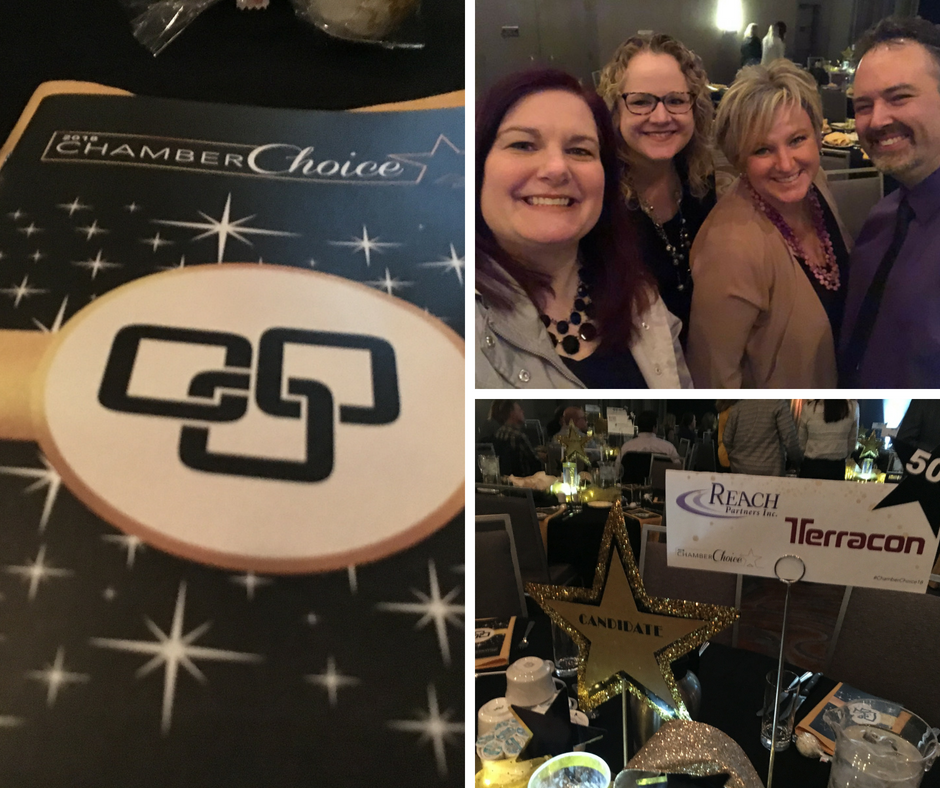|
There are times when gratitude overwhelms you, when it covers you like a warm, fuzzy blanket.
Last week was one of those times. On Friday, we attended the ChamberChoice Awards for the Fargo-Moorhead-West Fargo Chamber of Commerce. The program recognizes businesses, organizations, and entrepreneurs that make significant contributions to our community. We were one of the candidates for Small Business of the Year. We didn’t win. And yet, we had been encouraged. Somebody (thank you, anonymous angel!) nominated us to become a candidate. A team of enthusiastic clients/vendors/friends encouraged us to fill out the application. They wrote reference letters and helped us navigate the application questions. There’s something both humbling and gratifying about summarizing your work into a few short pages. Applying for the ChamberChoice Award gave us an opportunity to reflect on where we’ve been and where we’re going. So, no, we didn’t win. But we are grateful for the process and for those who served as cheerleaders along the way. We felt valued. Congrats to the organizations and individuals that won in their respective categories: Emergency Food Pantry, Great Plains Food Bank, Prairie Winds Veterinary Center, Eide Bailly, Office Sign Company, Tyrone Leslie, and Ronald McDonald House Charities of the Red River Valley. Well-deserved! It was fun to celebrate your success. And for everyone else: take a moment to nominate a favorite business or nonprofit next year. It may be the nudge they need to become a candidate. It’s one more way to encourage and support the wonderful business community we have in Fargo-Moorhead. —Anita, Rachel, and Sean
0 Comments
There are few things worse in business than showing up for a meeting that has been poorly planned. You don’t know why you’re there or what needs to be accomplished. The organizer either hasn’t taken time to plan the purpose or – perhaps – hasn’t bothered to share the purpose with those around the table.
The solution to this problem is easy, people: Write an agenda. Send an agenda ahead of time. Print an agenda. (And, yes, you should do all three). It may seem like a lot of pre-work, but every time you write and appropriately share an agenda, you’ll thank yourself. Here’s why: Provides Direction An agenda is a mini-plan. It’s a small step in a larger plan that provides structure and direction. And, frankly, it also keeps teams focused on priorities. Without an agenda, you’ll be less productive. You’ll have co-workers who get off topic and spend 20 minutes rehashing what happened over the weekend. Then you’ll spend 30 minutes agonizing over the color of flowers in a centerpiece when you really needed to decide the lunch menu. The weekly staff meetings at Reach Partners have a set agenda. I think of agenda topics more like buckets. The specific items under each bucket change weekly, but we are always focused on our three major priorities: financials, marketing, and workload. Without a clear agenda, it is too easy to discuss things that don’t matter. Saves Time (and Resources) Nobody wants to meet for the purpose of meeting. A good agenda saves time and respects stakeholders’ time commitment. Since there’s a purpose and people know what it is, they are less likely to regret coming. In addition, a good agenda lists a start time and an end time, so people know what they are committing to beforehand. Time is money and meetings are expensive. If you have 10 people attending a meeting and each person’s wage is $25 an hour, it costs $250 for every hour that group meets. An agenda helps make the most of that time. I’ve been part of meetings where the project lead dismissed people after agenda items that pertained to them were done. At first it felt harsh and abrupt, but I’ve changed my mind. This person was giving people the gift of time. If the rest of the meeting didn’t pertain to them, they could be doing something more productive. Encourages Engagement The general purpose of any meeting is to get a group of people together for some focused reason. The underlying premise is that each person invited has expertise to share or important opinions to be expressed. An agenda sent ahead of time (no later than three days before the meeting) gives each stakeholder an opportunity to review, think, research and prepare. You want people to be engaged during the meeting, and there is a better chance of that if attendees know what to expect. Without an agenda, attendees may be asked questions that they didn’t prepare for. Or the group isn’t prepared for the discussion you wanted to have or didn’t bring the data needed to support meaningful conversation. An agenda sent ahead of time is more useful than one provided when you walk in the door. However, neglecting to send an agenda ahead of time doesn’t give you permission to not have one at all. A late agenda is better than no agenda at all. Defines Next Steps At the end of a recent meeting, I reached the last item on the agenda: review responsibilities. “John,” I said. “You are doing _______.” John quickly responded: “Oh, yes. I’m going to write that down.” Include a quick “review” item at the end of every agenda. That plus a brief recap of the previous meeting at the beginning of every meeting put everyone on the same page quickly. We are more successful when we all know what’s going on, where things are headed, and what needs to be done. In summary, I’ve never seen a meeting without an agenda go well. If I don’t know how to prepare or who will be attending, it feels like a waste of time. Of course, an agenda doesn’t mean that the meeting has to be stuffy or formal. You can still have fun and share a story or two. Flexibility is allowed. Just keep your meeting purposeful and focused. Everyone will thank you. –Anita When you were a kid, what did you want to be when you grew up?
We imagined all sorts of professions: lawyer, teacher, nurse. Project management never once entered our minds. Not once. Not surprisingly, none of us knew anybody who had this job. We certainly didn’t realize that our skills could be used to orchestrate a group of people to get a single job complete. Today, we can’t imagine being anywhere else, doing anything else. One benefit of being project managers is that we get to practice our work skills in our home lives, too. The qualities that make us good planners, organizers, and schedulers at work make life better for our friends and families – just ask us. Or ask them. After all, living us means our families get their very own private project managers . . . all the time. Aren’t they lucky?! Maybe says Lloyd, Anita’s husband. “We don’t have big projects to manage, but the fact that she organizes our trips and events is pretty handy. It is nice that she has given thought to it before everyone else has,” he says. On that note, here is what it is like to live with a project manager, from the experience of those who actually do: Maintains Family Calendars If there is more than one person living in your household, you need to keep track of everyone. Somebody needs to know when soccer games fall and when cookies are needed for the church supper. Nobody does this better than a project manager who is already experienced at keeping tabs on everyone involved with a project. Anita is what Lloyd calls a “Google calendar maniac.” She has assigned a calendar for every member of the family. And she successfully juggles them all, keeping everyone in the know as they run off to track meets, evening obligations, and more. The beauty of a project manager is that whether or not the kids and spouse pay attention, the family gets to the right place at the right time with the right shoes, ball, and money for snacks. Yes, the project-manager-mom is the family motivator. Keeps Household Projects on Time There’s a saying that the plumber’s sink is always the last to be fixed. Apparently, that doesn’t fall true for project manager households. When Rachel and her wife, Melissa, hosted their niece’s baby shower, the couple identified several house projects that needed to get done before the event. Rachel went into project manager mode and made sure the resources and time were available to get things done in a timely manner. She also allocated time for the work to be completed. Project management skills for the win! Organizes Holidays, Reunions If you are fortunate enough to have a project manager in your family, you’ve likely tapped him or her to plan a holiday gathering or family reunion. If not – you should! Rachel’s dad, Bruce, asked her to manage all details of a large family gathering. She set the stage for everything from communication to the food, the cemetery tour route, the family fun-run, and fishing tournament. Everyone knew the schedule and expectations for the reunion. As a result, everyone was relaxed and could focus on the time together instead of trying to negotiate activities and meals on the fly. Makes Lists The beauty of any list is not the list itself, as any project manager will tell you. Instead, lists reflect thinking about peoples’ roles and how they can contribute to the objective at hand – whether it’s leaving for vacation, inviting extended relatives to a picnic, or organizing contractors to finish house projects. Anita likes to make a list for everything, which is super helpful when the Hoffarth family plans a trip or weekend getaway. Lloyd observes that there’s always a list ready to go once they start to pack. This ensures that everyone has clean socks and a toothbrush along – and nothing critical gets left behind. Rachel compiles lists and sets them out for big meals and gatherings, says Melissa. This encourages (and enable) others to help get food to the table. The list includes details such as timing and what specific bowl or spoon is needed to serve the dish. Because of Rachel’s planning, others can easily step in and assist. Can’t Turn it Off There are times when a project manager’s take over of family projects isn’t as welcome. Lloyd had created a master document, one of those documents with important personal information on it that could be handy in case of an emergency. He spent years developing that list and knew how to find everything on it. He then shared the document with Anita, so she would have access to it. Within a day she started to rearrange and re-organize the list. This experience made him rethink the benefits of living with a project manager. “An on/off switch – when I want it – would be nice” he says. And maybe that’s the challenge of living with a project manager. Most of us aren’t wired to be off even when we’re away from work. Good thing our families and friends (mostly!) embrace that. |
Reach PartnersYour partners in leadership. Categories
All
Archives
July 2024
|
|
|
Reach Partners, Inc
3330 Fiechtner Dr. Suite 100 Fargo, ND 58103-2321 701-271-8170 Copyright (C) 2024 Reach Partners Inc.
|



